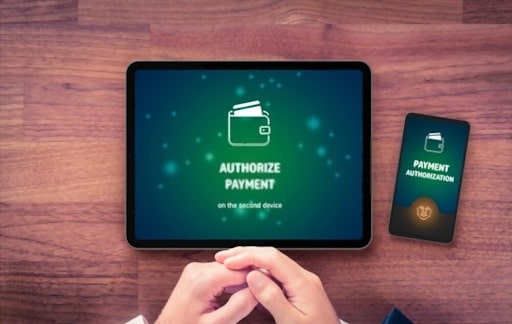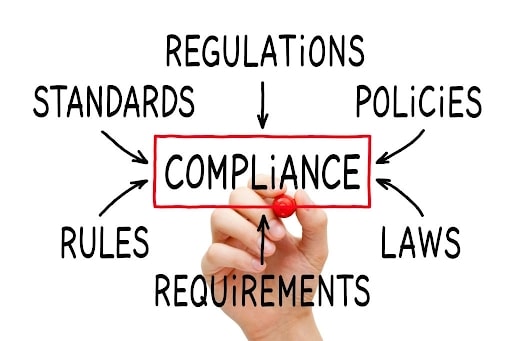
Why is Security Important in FinTech Software Development?
The vast majority of human activities today require technology and the internet, in one way or another. A prime example of this is the financial industry, where fintech is permeating every aspect.
However, despite all the advantages that technology affords us, it also comes with risks and disadvantages. One of the most prominent is insecurity – and the fintech industry is especially susceptible. It is not hard to fathom why: the ability to breach fintech software provides access to data and information that malicious actors can use to access their money.

Because of this, security is a vital component of fintech software development that every potential creator has to address. This article examines possible risks to fintech solutions, the importance of compliance, and the solutions to certain issues.
Finally, we will provide a conclusive way for companies who want to incorporate fintech solutions into their operations to ensure utmost security.
Let’s get started!
FinTech Issues and Risks
Contrary to what you might think, fintech solutions are not all smooth sailing. In fact, they face a wide range of issues and risks. The rapid growth of digital platforms renders them susceptible to security network breaches. Also, integrating fintech services into traditional banking solutions can generate certain data security issues.
In order to provide effective solutions, it is important to identify and understand the industry risks. Below are some of them.
Third-Party Security Risks
The internal security of traditional banks and other non-fintech financial institutions are often inefficient. To avoid these inefficiencies, some institutions use fintech services from untrustworthy providers. Unfortunately, this can result in a wide range of issues like data loss, service failure, or even reputation loss.
Luckily, there is a way to eliminate these data security problems. Banks and other financial institutions should address the risks in their relationships with fintech services in their risk management assessment.
Malware Attacks
The most common type of fintech security issues in the global market today are malware attacks and hacking. And in recent times, hackers have become more brazen. For instance, there have been attempts to hack the Society for Worldwide Interbank Financial Telecommunication (SWIFT). SWIFT is an organization whose systems are utilized by several top financial institutions, like traditional banks, to exchange important financial information.

These attacks point to one thing: hackers now have highly sophisticated tools. As such, fintech companies must direct more effort at putting in place better security measures. Failure to do this could spell disaster as they will be susceptible to attacks.
Data Breaches
That data is vital to all industries, regardless of what it specializes in, is an indisputable fact. However, with banks and other financial institutions, it assumes a position of utmost importance. Unfortunately, data breaches continue to increase due to the inefficient nature of the fintech systems. Consequently, online transaction details, such as user information and payment card details, are readily available to hackers.
Application Security Risks
Several financial institutions use fintech apps to access their customer's financial information. This information is necessary to conduct financial transactions and perform other banking operations.
To protect your customer's financial information from being vulnerable to cyber-attacks, you have to properly develop your fintech software. That is, the fintech software development process must have foolproof security modules and efficient codes. This is because a fintech application with weak security compromises customer data and other vital information. And this can open them up to exploitation by malicious operators. Consequently, ensure the fintech solutions you develop are secure and have all necessary security features.
Digital Identity Risks
Mobile-based services have also seen an upsurge in use following the introduction of digital tools into the banking and finance industry. However, these services use security codes and one-time passwords. They are not very secure and susceptible to hacking. As a result, they make it easy for hackers to compromise customers’ vital data.
So, when you are developing a fintech solution, endeavor to go through its online security architecture and address this risk factor definitively.
FinTech Compliance
To improve compliance in fintech organizations, the regulations that must be adhered to are determined by the company's location and target audience. If the organization fails to comply, it stands the risk of being isolated from markets. What’s more? Failure to comply can also result in a loss in productivity, fines, penalties, and business disruption, all of which are bad for business and will hurt its bottom line.

To ensure data security and protection, endeavor to adhere to the financial services compliance regulations that apply to your organization. Below, we discuss some of the more common ones.
General Data Protection Regulations (GDPR)
GDPR is a financial compliance regulation that ensures the data security of the residents of the European Economic Area and European Union member countries. This regulation applies to every organization that operates within this entity, even those from outside Europe.
If a company refuses to comply, then it cannot operate in Europe.
Electronic Identification and Trust Services (eIDAS)
eIDAS is another European fintech regulation that protects financial transactions and ensures data privacy within Europe’s borders. Similar to GDPR, this regulation applies to businesses within and outside Europe that use European residents’ data. The main objective of eIDAS is to create a legal environment that facilitates interactions between fintech companies, government bodies, businesses, and EU residents.
Second Payment Services Directive (PSD2)
The PSD2 is yet another European regulation. It aims to ensure that technologies used by banking service providers are secure. What’s more? It regulates cross-border electronic payments.
Financial Conduct Authority (FCA)
FCA is a United Kingdom regulation that supervises all financial transactions and protects customer data, thereby ensuring data integrity.
Payment Card Integrity Data Security Services (PCI DSS)
The PCI DSS is a fintech regulation that supervises the gathering, transmissions, and storage of credit card information.
Some other fintech regulations you should pay attention to are:
- Good Practice Guide 13 (GPG 13)
- Act on the Protection of Personal Information (APPI)
- Personal Information Protection Act (PIPA)
Solutions for Fintech Security
The fintech industry works with several terabytes of customer data and financial information. These include bank accounts, identity data, and passwords. This makes it a prime target for exploitation. For this reason, it is plagued with numerous cybersecurity challenges that continue to rise.

Despite this, the Internet Society believes that about 95% of security breaches can be prevented. However, a proactive rather than reactive approach must be adopted.
The following are some of the solutions to fintech insecurity:
Encrypt Sensitive Data
The first thing you want to do is ensure that all sensitive data is protected through data encryption methods. Encryption is a data scrambling method that protects information by hiding it from unauthorized users. It employs cryptographic tools that convert plaintext to ciphertext, thereby causing unauthorized persons to see random alphanumeric strings. An example of this tool is the cryptographic hash function.
Encrypting data has many advantages for sensitive and confidential data, which includes the following:
- It improves the integrity and quality of data
- It secures digital identity and thus maintains privacy
- It enables user protection across multiple devices
Employ firewalls and Antivirus
Another primary security component you need to integrate into your fintech software is firewalls and antiviruses. These two components function in different yet highly essential ways. For instance, firewalls work to prevent web-based malware attacks and intrusion attempts. On the other hand, antiviruses protect your software from contacting viruses, malware, spyware, etc.
Bear in mind that the more recent firewalls are more powerful than their older counterparts. The reason is that they offer better control over specific applications in a network. They also offer improved inspection.
Firewalls and antivirus have several benefits, including:
- Firewalls are better equipped to monitor traffic; hence, they can easily decipher the data being sent or received
- Modern firewalls have integrated intrusion detection systems and intrusion protection systems, in addition to the features of the traditional firewall
- Despite the increasing number of servers they protect, modern firewalls can maintain high network speeds
- Modern firewalls have malware protection and antivirus and can be regularly upgraded
- Effective antivirus solutions protect against phishing attacks, which is the unauthorized attempt to steal or infect sensitive data
- Top antivirus solutions protect against viruses, malware, spyware, etc., and can be upgraded continuously
- Antivirus software can protect against several other online threats
Use Multi-Factor Authentication
Cybercriminals today use sophisticated tools, and as such, can easily hack passwords. For this reason, it is not advisable to rely on the password feature alone to secure customer data. Fortunately, a more secure authentication option is to integrate multi-tiered authentication into the fintech app during the development process.
Multi-tiered authentication, or multi-factor authentication (MFA), is an authentication process that involves making more than one identity verification claim. The app using this authentication type verifies all verification claims before it grants the user access to its services. These claims could include passwords, fingerprints, and a specific identifier of the device, among others.
Be Smart about Cloud Computing
Managed cloud service providers offer numerous benefits. And that is why numerous organizations are incorporating them into their IT infrastructure. However, you need to be smart about using this technology if you are to get the best from it.

Cloud computing has several deployment methods, which include the following:
Public cloud: In this deployment method, cloud services are owned, managed, and provided by third parties. With this method, you will be sharing computing resources with other companies. While this cloud computing method enables you to save costs, it is not ideal for hosting sensitive data.
Private cloud: In the private cloud, only one organization uses and controls the computing resources. You can choose to host this cloud service through a third-party provider. Or you can simply implement it in your data center. As expected, this cloud computing method enables you to take full control of the cloud infrastructure. However, it costs more to use.
Hybrid cloud: This deployment model is a combination of both private and public clouds. With this model, you can host data and apps of sensitive nature on the private cloud and other data and apps on the public cloud.
Ultimately, the type of cloud computing service you use will depend on the data and apps you want to host. For sensitive and confidential data, there is only one option you should choose, and that is hosting on a private cloud.
How Can You Improve a Fintech Security-Focused Approach
Cyber Attackers constantly improve their skills and tools. Therefore, if you relax, you will eventually be vulnerable to their attacks. The first step towards total security is a strong implementation of security measures. The next step after this is to continuously improve on it.
Below are some of the methods you can use to achieve this:
Code Obfuscation
One of the most common tools hackers deploy is creating program clones, which appear similar to the original software. Besides that, they enable hackers to access customer's financial information. However, code obfuscation is a method fintech companies can use to defeat this tactic, as it prevents the cloning of software programs.
The code obfuscation process works by making it difficult for cyber attackers to analyze the app's code. Also, it obfuscates their understanding of an app’s algorithm, thus preventing them from employing reverse engineering methods.
Secure Identification and Authentication
Employing secure identification and authentication methods is an essential part of creating safe and secure fintech software. Some methods you can use to facilitate this are:
- Shorter session durations
- Setting a limit for sign-ins
- Role-based access control (RBAC)
- Password expiration
Tokenization
Tokenization is when a system creates a token, or short piece of code, to replace real user data. However, this code is encrypted and can't be reverted to original data. They are designed for temporary usage and expire after a single-use. This method efficiently avoids situations that make it possible for cyber attackers to track sensitive data during transactions.
- Some other ways to improve a fintech security approach are:
- Use Artificial Intelligence (AI) and Machine Learning (ML)
- Increase use and reliability on advanced blockchain systems
- Create secure code and architecture
Develop Secure Fintech Solutions with Boston Unisoft
Fintech solutions make transactions easier and faster, and this benefits businesses. However, if they are not properly developed and with a robust security system, they can result in additional problems for an organization. Companies cannot afford to get this wrong.
With Boston Unisoft Technologies, they do not need to fear getting it wrong. For several years, our company has developed numerous and secure fintech solutions for clients all over the country. And, if nothing else, we can pride ourselves on always developing something satisfactory for our customers.
Contact us today for a solution that will ease your business processes and, at the same time, allow you to have peace of mind due to how secure it is.